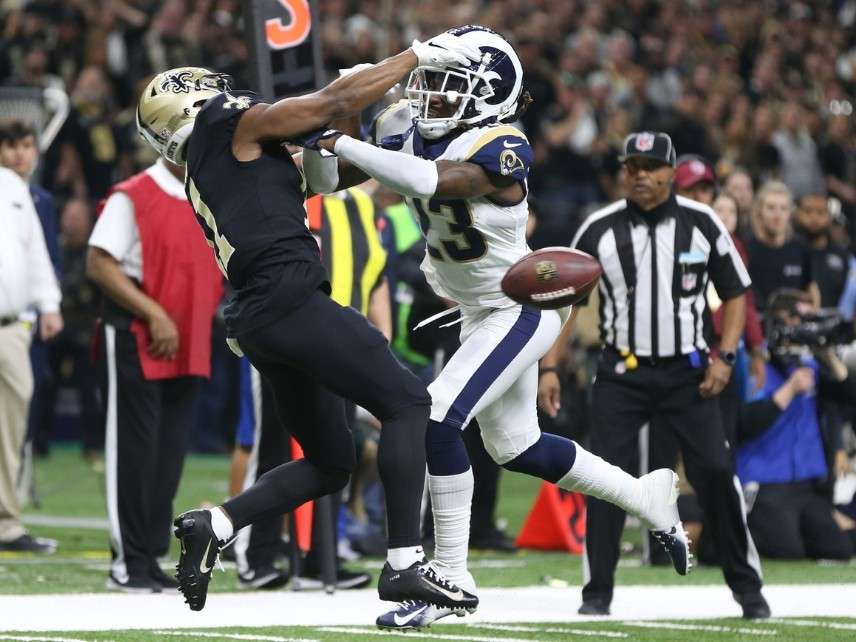Don't Call Congressional Interference on a No-Call Pass Interference
The Saints were robbed. But that's not Congress' problem.

Most NFL fans wouldn't deny that the New Orleans Saints were robbed of a chance to play in Super Bowl LIII. But is the issue really worthy of congressional intervention?
Rep. Cedric Richmond (D–La.) told The Washington Post's Mike DeBonis yesterday that he has broached the possibility of NFL Commissioner Roger Goodell answering questions from congressmen about the blown call at the end of Sunday's NFC championship game.
For those who missed it: The Saints and the Los Angeles Rams were tied at 20 with less than two minutes to play. On a third down at the 13-yard line, Saints quarterback Drew Brees threw a pass intended for receiver Tomylee Lewis. But Lewis couldn't haul it in, because Rams cornerback Nickell Robey-Coleman ran into him well before he could make the catch.
As Robey-Coleman himself later admitted, the referees should have thrown a penalty flag for defensive pass interference. Had they done so, the Saints would have been awarded an automatic first down. Then they could have run out the clock and kicked an easy field goal as time expired to punch their ticket to the Super Bowl. Instead, they had to kick a field goal with plenty of time remaining. The Rams' offense then drove down the field to tie the game before winning in overtime.
"The Saints should be on their way to Atlanta to play in the Super Bowl," Richmond says in a statement. "Instead, they are left with the memory of officials who failed to create an equal playing field and deprived them of that opportunity. Officials should not have the ability to determine the fate of a team who rightfully earned their place in NFL championship history."
From an NFL fan's perspective, Richmond is absolutely right. But Richmond isn't just a Saints fan; he's a member of Congress. "I have since spoken with colleagues on the Judiciary Antitrust Subcommittee about inviting NFL Commissioner Roger Goodell to answer some important questions about the unfair call against the Saints; a call that he has the jurisdiction to overturn," his statement says.
Richmond was likely referring to a section of the NFL rulebook giving the commissioner "the sole authority to investigate and take appropriate disciplinary and/or corrective measures" in the event of an "extraordinarily unfair" occurrence that "has a major effect on the result of the game." But the rules also state that this authority will not be applied "in cases of complaints by clubs concerning judgmental errors or routine errors of omission by game officials."
Richmond was not the only elected official to complain about the call. Louisiana Gov. John Bel Edwards has written a letter to Goodell expressing his "deep disappointment" with the game's outcome. Edwards calls on Goodell to make changes so that something similar never happens again, though he stops short of suggesting the government might take official action.
Both Richmond and Edwards are clearly pandering to the Saints' rabid fan base. But Richmond's statement, if taken seriously, raises concerns. Yes, Saints fans want answers, but it's not Congress' job provide them.
This situation draws some parallels with Congress' interference in baseball's steroid scandal. Back in 2005, high-profile players such as Sammy Sosa, Mark McGwire, Curt Schilling, and Rafael Palmeiro were dragged before Congress to testify on performance-enhancing drugs (PEDs). Major League Baseball had previously been granted an exemption from federal antitrust law (the NFL enjoys a similar exemption), which Congress used to justify the hearings. But as Reason's Matt Welch wrote at the time, Congress had no business interfering in the relationship between Major League Baseball and its players.
But that didn't seem to matter then, just as it didn't seem to matter nearly three years later, when star pitcher Roger Clemens testified about his alleged PED use. As Welch and Nick Gillespie noted in The Washington Post, "sorting out the morality and legality of self-improvement has more to do with aesthetic revulsion and moral panic than with considered science or logic."
"In other words," they explained, "it's not remotely a job for Congress."
The same goes for referees who blow calls. Just because fans are mad doesn't mean the government needs to get involved. Better to let the NFL work out its issues on its own. And indeed, the league is reportedly considering making pass interference calls (and no-calls) reviewable, which would likely prevent a similar blown call from having a major effect on a game.
Bonus link: The five worst government interventions in sports.


Show Comments (53)